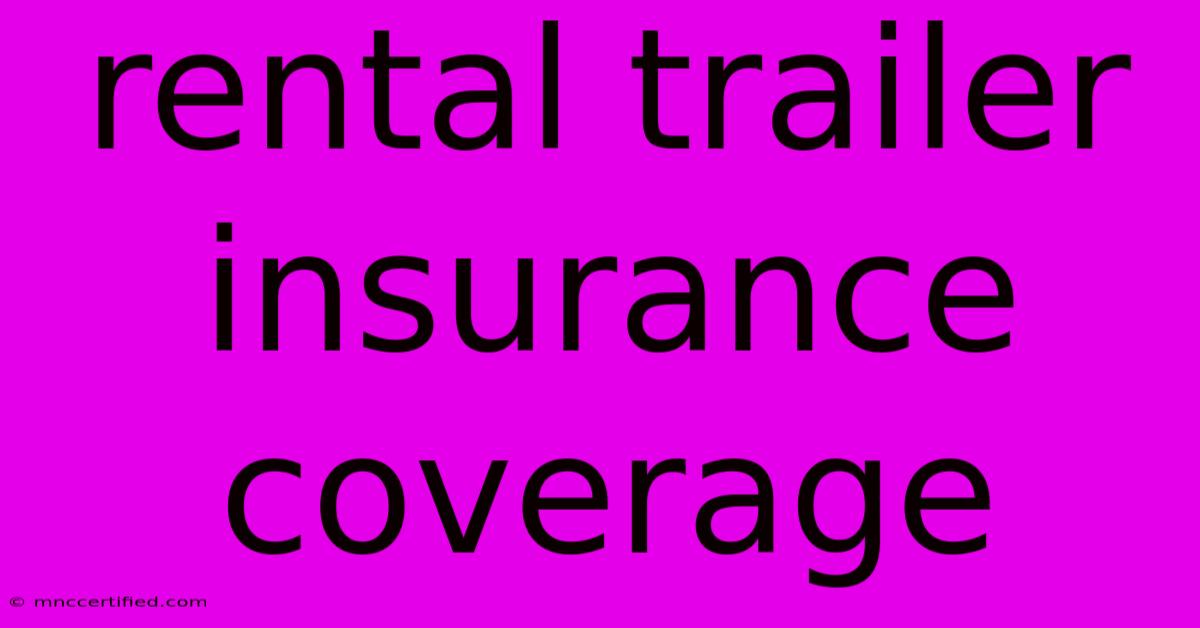Rental Trailer Insurance Coverage

Table of Contents
Rental Trailer Insurance Coverage: Protecting Your Assets on the Road
Renting a trailer can be a convenient and cost-effective solution for moving, hauling equipment, or transporting recreational vehicles. However, accidents and unforeseen events can happen, leaving you with potentially significant financial liabilities. This is why understanding rental trailer insurance coverage is crucial before you hit the road. This comprehensive guide will break down everything you need to know to protect yourself and your belongings.
What Does Rental Trailer Insurance Typically Cover?
Rental trailer insurance, often offered as an add-on to your existing auto insurance or as a separate policy, typically covers damages and liabilities associated with the rented trailer. The specific coverage can vary depending on the rental company and your chosen policy, but generally includes:
- Collision Damage Waiver (CDW): This covers damage to the trailer itself, such as dents, scratches, or even complete destruction, resulting from an accident. It's important to note that CDW often has a deductible.
- Liability Coverage: This protects you against financial responsibility for injuries or property damage caused to others in an accident involving the rented trailer. This is arguably the most critical aspect of rental trailer insurance. Without it, you could face substantial costs if you are at fault.
- Uninsured/Underinsured Motorist Coverage: This coverage helps protect you if you are involved in an accident with an uninsured or underinsured driver. This is especially important given that not all drivers carry adequate liability insurance.
- Comprehensive Coverage (Sometimes): While not always included, some policies offer comprehensive coverage, which protects against damage to the trailer not caused by a collision, such as theft, vandalism, or fire.
What's NOT typically included?
It's crucial to be aware of what is not usually included in standard rental trailer insurance:
- Personal belongings: Your personal possessions inside the trailer are generally not covered unless you have separate cargo insurance.
- Towing: Towing costs after an accident are usually not included and should be considered separately.
- Loss of use: Compensation for the inability to use the trailer while it's being repaired isn't often covered.
How to Choose the Right Rental Trailer Insurance
Selecting the right insurance coverage involves careful consideration of your needs and risk tolerance:
- Assess your needs: Consider the value of the trailer and the potential costs associated with damages or accidents. A higher-value trailer or frequent use necessitates more robust coverage.
- Compare policies: Get quotes from multiple insurers or rental companies. Don't just focus on the price; compare the levels of coverage offered. Look closely at deductibles and coverage limits.
- Understand your existing auto insurance: Check if your existing policy offers any coverage for rented trailers. Some policies provide limited coverage, potentially reducing the need for a separate policy.
- Read the fine print: Carefully review the policy documents to understand the terms, conditions, exclusions, and limitations.
Keywords for better SEO: rental trailer insurance, trailer insurance, rental insurance, trailer rental insurance, collision damage waiver, liability coverage, uninsured motorist coverage, comprehensive coverage, cargo insurance, towing insurance.
Frequently Asked Questions (FAQs)
-
Q: Do I need separate insurance for a rented trailer? A: It depends. Check your existing auto insurance policy first, but in most cases, separate rental trailer insurance is highly recommended for comprehensive protection.
-
Q: What happens if I damage the rented trailer? A: The extent of your liability will depend on your insurance coverage. CDW will usually cover damage, but you may be responsible for the deductible. Liability coverage protects you against claims from third parties.
-
Q: How much does rental trailer insurance cost? A: The cost varies depending on factors such as the type of trailer, rental duration, and the coverage level.
Conclusion
Renting a trailer offers flexibility and convenience, but adequate insurance is non-negotiable. By understanding the different coverage options, comparing policies, and addressing your specific needs, you can protect yourself financially and enjoy peace of mind on the road. Don't underestimate the importance of rental trailer insurance – it could save you from substantial costs in case of an accident or unexpected event. Remember to always thoroughly review the terms and conditions of any policy before signing.

Thank you for visiting our website wich cover about Rental Trailer Insurance Coverage. We hope the information provided has been useful to you. Feel free to contact us if you have any questions or need further assistance. See you next time and dont miss to bookmark.
Featured Posts
-
Hanson Insurance Agency Hanson Ma
Nov 19, 2024
-
So Cal Thanksgiving Record Travel Numbers Predicted
Nov 19, 2024
-
Get Sidemen Charity Match 2025 Tickets
Nov 19, 2024
-
Insurance Ce Classes With No Exam
Nov 19, 2024
-
Data Center Firms Plan Boosts Super Micro Stock
Nov 19, 2024